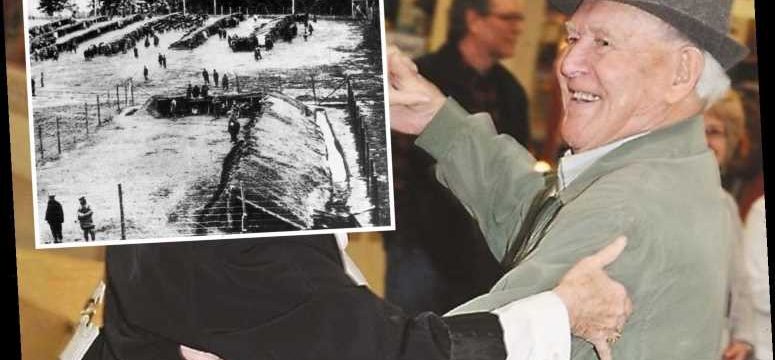AN elderly former Nazi concentration camp guard will be deported from the US after living in the States for more than 60 years.
On Thursday, the Board of Immigration Appeals (BIA) dismissed the appeal of Tennessee resident Friedrich Karl Berger, a 94-year-old German citizen who was ordered removed from the US earlier this year for his service in a Neuengamme sub-camp near Meppen, Germany during the 1940s.
Prisoners included “Jews, Poles, Russians, Danes, Dutch, Latvians, French, Italians, and political opponents” of the Nazis who were forced to live and work in “atrocious” conditions, and exploited for outdoor forced labor “to the point of exhaustion and death”.
The court heard that Berger’s role was to guard the prisoners and prevent them from escaping.
Berger had attempted to overturn a February 28 decision made by Immigration Court Judge Rebecca Holt to deport him to Germany, where he is still a resident and continues to receive a pension “for wartime service”.
Holt determined that Berger could be deported under the 1978 Holtzman Amendment to the Immigration and Nationality Act due to his “willing service as an armed guard of prisoners at a concentration camp where persecution took place”.
Deputy Assistant Director Louis A. Rodi III of U.S. Immigration and Customs Enforcement’s (ICE) Homeland Security Investigations (HSI) National Security Investigations Division, which oversees the Human Rights Violators and War Crimes Center, said Berger was “an active participant in one of the darkest chapters in human history”.
“He attempted to shed his nefarious past to come to America and start anew, but thanks to the dedication of those at the Department of Justice and Homeland Security Investigations, the truth was revealed,” Rodi continued.
“War criminals and violators of human rights will not be allowed to evade justice and find safe haven here.”
Berger, who came to the US in 1959 with his wife and daughter and has two grandchildren, told the Washington Post the ruling was “ridiculous”.
“After 75 years…I cannot believe it,” he said.
“I cannot understand how can happen in a country like this. You’re forcing me out of my home.
“I was 19 years old. I was ordered to go there.”
The decision to deport Berger was upheld on the eve of the 75th anniversary of the commencement of the Nuremberg trials of the surviving leaders of the defeated Nazi regime.
“Berger’s willing service as an armed guard at a Nazi concentration camp cannot be erased and will not be ignored,” said Acting Assistant Attorney General Brian C. Rabbitt of the Justice Department's Criminal Division.
“This case shows that the passage of time will not deter the department from fulfilling the moral imperative of seeking justice for the victims of their heinous crimes.”
After a two-day trial in February, the judge said that Meppen prisoners were held during the winter of 1945 in “atrocious” conditions and were exploited for outdoor forced labor, working, “to the point of exhaustion and death,” according to the Department of Justice. The court further found, and Berger admitted, that he guarded prisoners to prevent them from escaping during their dawn-to-dusk workday, and on their way to the worksites and also on their way back to the SS-run subcamp in the evening.
At the end of March 1945, as allied British and Canadian forces advanced, the Nazis abandoned Meppen. The court found that Berger helped guard the prisoners during their forcible evacuation to the Neuengamme main camp – a nearly two-week trip under inhumane conditions, which claimed the lives of some 70 prisoners. The decision also cited Berger’s admission that he never requested a transfer from concentration camp guard service and that he continues to receive a pension from Germany based on his employment in Germany, “including his wartime service”.
Berger's identity was revealed after a SS index card with his service record was discovered with other documents from a sunken German ship.
The index cards were recovered from the ocean and transcribed in 1950, but it took decades to link the information to Berger.
The case was initiated by the Human Rights and Special Prosecutions, a program set up “to detect, investigate, and remove Nazi persecutors”.
In 1946, British occupation authorities in Germany charged SS Obersturmführer Hans Griem, who had headed the Meppen sub-camps, and other Meppen personnel with war crimes for “ill-treatment and murder of Allied nationals”. Although Griem escaped before trial, the British court tried and convicted the remaining defendants of war crimes in 1947.
A DOJ spokesperson said that “since the 1979 inception of the Justice Department’s program to detect, investigate, and remove Nazi persecutors, it has won cases against 109 individuals”.
“Over the past 30 years, the Justice Department has won more cases against persons who participated in Nazi persecution than have the law enforcement authorities of all the other countries in the world combined,” the statement read.
HRSP’s case against Berger was part of its ongoing efforts to identify, investigate and prosecute individuals who engaged in genocide, torture, war crimes, recruitment or use of child soldiers, female genital mutilation, and other serious human rights violations.
Source: Read Full Article


